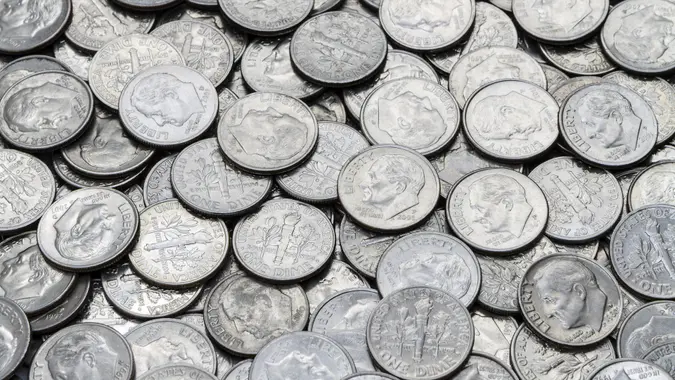What Are Assets? Definition, Types and How They Help Build Wealth

Commitment to Our Readers
GOBankingRates' editorial team is committed to bringing you unbiased reviews and information. We use data-driven methodologies to evaluate financial products and services - our reviews and ratings are not influenced by advertisers. You can read more about our editorial guidelines and our products and services review methodology.

20 Years
Helping You Live Richer

Reviewed
by Experts

Trusted by
Millions of Readers
An asset constitutes anything that holds monetary value, whether current or future, to a person or organization. Businesses, governments and non-profits all own assets. So do many people.
An asset is essential for growing your net worth. If you can exchange something for money, it’s an asset.
How Are Assets Classified?
Accountants sort and classify assets along several metrics, including:
- The time frame in which they expect to be used
- Whether the asset physically exists
- How easy it is to convert the asset into cash
Other examples of assets include your bank accounts, 401(k) and other retirement and investment accounts. You can liquidate these accounts by withdrawing your money or by selling the investments within the accounts.
Business assets might include equipment and machinery, both of which add to a company’s value.
How Assets Help You Build Wealth
Assets represent a fairly simple concept. Every asset you acquire, and every time those assets increase in value, your net worth grows. That makes assets a vital component for building wealth.
Types of Assets
Assets are classed into several groupings. Some of these categories overlap. Currency, for example, is both a liquid asset and a tangible one.
1. Liquid Assets
- Easily convert to cash or a cash equivalent
- Examples: Stocks, bonds, cash
Liquid assets can be easily sold or converted into cash or a cash equivalent. Cash is the most liquid asset because it doesn’t require conversion. Other examples of highly liquid assets include bonds and stocks.
2. Nonliquid Assets
- Hard to convert quickly
- Examples: Real estate, art
Nonliquid, or illiquid, assets take longer to sell. A few examples of illiquid assets include real estate, art and jewelry.
3. Tangible Assets
- Physical items that may hold value
- Examples: Cars, gold, precious metals, jewelry, electronics
Tangible assets represent any physical item that can be used or exchanged for economic value. Everything from gold ingots to houses constitutes tangible assets. A company’s inventory, heavy machinery and shipping fleet are all examples of tangible assets in a business setting.
4. Intangible Assets
- Nonphyiscal items that can offer value
- Examples: Patients, trademarks, digital assets
As the name suggests, intangible assets cannot be touched or held. Trademarks, designs, blueprints, electronic art, song lyrics, patents and other forms of intellectual property are all examples of intangible assets.
What’s Considered an Asset? 8 Examples
Specific examples of personal assets are nearly endless in number, but they all have something in common: You can sell or otherwise liquidate them to receive their value in cash. Take a look at these examples:
Cash
Cash is the yardstick for determining whether or not something counts as a liquid asset because it’s the most liquid asset you can own.
Cash Equivalents
Cash equivalents are intangible assets that are so easy to liquidate and have such low risk that they’re considered essentially to be cash. Checks you receive are cash-equivalent because you can deposit them and receive the cash almost immediately. Deposit accounts at your bank are cash-equivalent, and so are certificates of deposit with terms of 90 days or less.
Investments
Gold futures, stocks, bonds, mutual funds and other marketable securities are intangible assets because you can’t touch them. Some are also highly liquid because you can sell them quickly on the open market. Others are illiquid. Hedge funds and private equity funds, for example, can be extremely volatile and difficult to sell.
Retirement Accounts
Retirement accounts are tax-advantaged investment accounts that can hold any number of assets. Many include safe cash equivalents like money market funds and Treasury securities, and slightly less liquid investments like stocks and bonds that can produce higher growth. The assets are usually intangible, although self-directed IRAs allow for real estate and certain other tangible assets.
Insurance Policies
Annuities and cash-value life insurance policies, such as whole life, universal life and variable life, are assets because they accumulate cash value from interest earned on some or all of your premiums, or from returns on premiums the insurer invests on your behalf.
Vehicles
Cars, motorcycles, recreational vehicles and boats are tangible assets you can sell for cash. While you might be able to sell them easily, without incurring any costs, you might have to sell them for less than they’re worth if you need to get rid of them quickly.
Real Estate
Real estate typically appreciates over the long term. If you’ve purchased a home, you can live in it or generate income by renting it out. As desirable as it is, real estate is illiquid. Sales are complicated and expensive, and they take time to close.
Collectibles
Gold, art, jewelry, antiques and coin collections all have value you can tap by selling them. But they can take a long time to appreciate in value. That, and the fact that the market for them is relatively small and specialized, makes collectibles difficult to sell. That’s why they’re considered non-liquid investments.
Liquid vs. Nonliquid Assets: Key Differences
Liquid assets are easily converted to cash. Non-liquid assets are also convertible to cash, but the conversion takes longer. Financial experts recommend owning both types to balance their benefits and risks.
| Asset Type | Examples | Liquidity |
|---|---|---|
| Liquid | Cash | High |
| Liquid | Checks | High |
| Liquid | Deposit accounts | High |
| Liquid | Certificates of deposit (90 days or less) | High |
| Liquid | Gold futures | High |
| Liquid | Stocks | Moderate |
| Liquid | Bonds | Moderate |
| Liquid | Mutual funds | Moderate |
| Liquid | Marketable securities | Moderate |
| Liquid | Money market funds | Moderate |
| Liquid | Treasury securities | Moderate |
| Liquid | Annuities | Moderate |
| Liquid | Cash-value life insurance policies | Moderate |
| Nonliquid | Hedge funds | Low |
| Nonliquid | Private equity funds | Low |
| Nonliquid | Real estate | Low |
| Nonliquid | Vehicles | Low |
| Nonliquid | Collectibles | Low |
The most liquid assets — cash and cash equivalents — are slow to appreciate, if they appreciate at all. Inflation could chip away at your dollar’s value, though you won’t lose much principal.
Liquid Assets
Liquid assets provide immediate access to your money. You have a cushion if there’s ever an unexpected expense or need to purchase a higher-growth asset.
Stocks and bonds are a bit less liquid, but riskier than cash. You can diversify your portfolio to reduce some of that risk. Try other types of investments too, such as REITs, which are nonliquid.
Nonliquid Assets
You’ll want to hold nonliquid assets over a longer period. They tend to increase in value over time, such as with real estate — those gains can be significant. It does take time to withdraw your money from these fund sources, though.
How Assets Affect Your Net Worth
The calculation for determining your net worth is simple:
Assets – Liabilities = Net Worth
Assets are one of two components of net worth, with the other one being liabilities. Liabilities are money you owe. For most people, that means consumer debt, such as credit cards and loan balances. Whereas assets add to your net worth, liabilities detract from it.
Of course, you need to know the values of your assets and liabilities in order to do the calculation. Creating a basic balance sheet is a good way to start, perhaps on a spreadsheet that’s easy to edit. Here are some steps you can follow:
- Use two sets of two columns — one set to list assets and the value of each, and one set to list liabilities and the value of each.
- Total the value columns to find your asset and liability totals.
- Then review and update them periodically to track your financial progress.
How To Build Wealth With Assets
Increasing your assets also increases your wealth, and purchasing assets that appreciate in value grows your wealth faster.
Example of Building Wealth With Assets
You take on a second job that pays $800 per month. If you keep that money in a jar on your nightstand, you’ll have $9,600, which is exactly the amount you earned, after a year. If, on the other hand, you invest the money in a high-quality stock fund, you’ll take on risk but will have a chance at a better return. A 10% annual return amounts to $452.45 in gains after a year and a total of $10,052.45 in added wealth.
Final Thoughts on Managing Assets
Assets encompass virtually anything that can return an economic benefit to the end user. For the individual, investing in financial assets is a key step toward achieving financial independence. A fiduciary financial advisor can expedite the process by helping you select the best mix of liquid and illiquid assets for your goals and risk tolerance.
What Are Assets? FAQ
- What are examples of assets?
- For an individual, assets might be a car, a house, investments and bank accounts.
- Business assets might be machinery, royalties and patents.
- What is the definition of an asset?
- An asset is an item that holds monetary value for a person or a business. It can be sold for cash, though some assets are easier to sell than others.
- Is cash an asset?
- Yes. In fact, it's the most liquid asset you can own, and it serves as the yardstick for measuring the liquidity of other assets.
- What are assets for a person?
- For an individual, an asset is anything that belongs to you and holds monetary value. Your bank account is an asset, and so is valuable jewelry or art you own. Houses, cars and stocks are common assets, as well.
Talon Abernathy contributed to the reporting for this article.
Our in-house research team and on-site financial experts work together to create content that’s accurate, impartial, and up to date. We fact-check every single statistic, quote and fact using trusted primary resources to make sure the information we provide is correct. You can learn more about GOBankingRates’ processes and standards in our editorial policy.
- Pentagon Federal Credit Union. 2023. "What Is the Difference Between Liquid and Illiquid Assets?"
- Corporate Finance Institute. "Tangible Assets."
- SVA Certified Public Accountants. 2024. "5 Depreciation Methods Business Owners Need to Know."
- International Monetary Fund. "Monetary and Financial Statistics Manual & Compilation Guide."
- U.S. Department of Labor. "Top 10 Ways to Prepare for Retirement."
- Corporate Finance Institute. "Cash Equivalents."
- Statefarm. 2023. "Types of personal assets and how to manage them."
- J.P.Morgan Wealth Management. 2023. "Investor's guide to balancing liquid and illiquid assets."
 Written by
Written by  Edited by
Edited by 

























